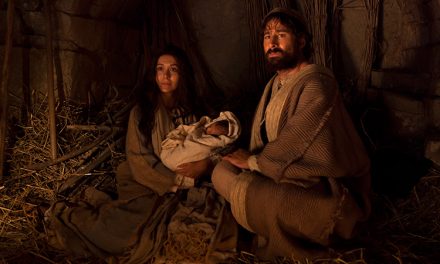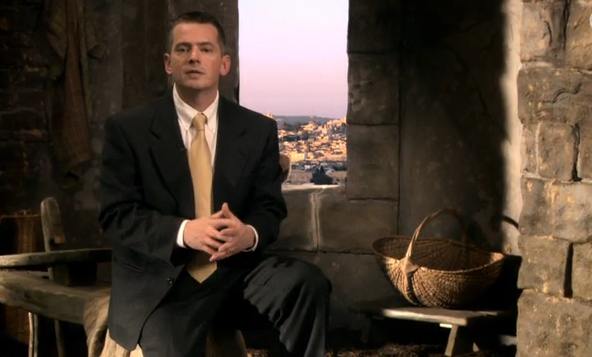As their resurrected Master ascends into heaven, the apostles are left with an angelic assurance that He will return in glory. The promise of the triumphant return of Jesus Christ resonates throughout the early Christian world, and prompts the ancient hymnist to declare, “Speak to me, Lord and Friend, and reveal to me, Son of the Most Beloved, the time of your coming, when you will appear at the end” (Hymn on the Second Coming of Jesus). Though some question the reality of a literal Second Coming, LDS scholars find in ancient and modern revelation the confirmation of Christ’s glorious return, and of the establishment of His kingdom on earth as it is in heaven.
KENT BROWN: The Mount of Olives. What a significant place for biblical history. So many important events have occurred here. Towering above the east side of Jerusalem, it has been the scene for a number of important historical events.
ANDREW SKINNER: To this mountain King David fled from his rebellious son Absalom.
KENT BROWN: Yes. And from here, the prophet Zachariah proclaims the Messiah.
ANDREW SKINNER: And of course the New Testament tells us that this mountain became a refuge as well as a place of instruction for Jesus and the disciples.
KENT BROWN: Jesus in fact teaches His parable of the virgins from here, and from somewhere above us, He looks out over the city and weeps.
ANDREW SKINNER: And of course on that fateful evening after the Last Supper, Luke records that Jesus came out, as He was wont, and came the Mount of Olives and His disciples followed him.
KENT BROWN: It seems only fitting that the resurrected Jesus, after spending forty days with His disciples teaching them, ascends to His Father from here.
 ANDREW SKINNER: And I think that the ascension of the Lord Jesus Christ from this mountain then is the fulfillment all of the sacred and secular history that occurred here.
ANDREW SKINNER: And I think that the ascension of the Lord Jesus Christ from this mountain then is the fulfillment all of the sacred and secular history that occurred here.
DANIEL PETERSON: At the conclusion of His forty-day ministry, Jesus took His disciples to the Mount of Olives, just outside and overlooking Jerusalem. And there He spoke to them for the last time, to equip them for what they would face. I don’t think they had any idea really what they would face.
One of the questions that was on their minds at that point was: would He restore the kingdom to Israel at that time? They thought possibly this was the fulfillment of their messianic hopes, the Second Coming they’d heard about. He’d died, He’d resurrected, He was back; maybe this was it—the kingdom was going to be restored to Israel.
ROGER KELLER: The apostles believed that the coming of the kingdom, because of Jesus’ Resurrection, was imminent. There were basically three signs that the Jews looked for, for the coming of the new age. One was the resurrection of the dead, which had clearly happened in Jesus and also others. The second was the coming of the Messiah. And the third was the return of the Spirit. Now in the book of Acts, that is yet to come. But these three signs of the coming of the new age are clearly here. And so it was perfectly legitimate for a Jewish audience to wonder about the nearness of that near age—new age that they had been expecting.
DANIEL PETERSON: In fact that wasn’t to be the case. It was going to be much delayed, much more than they could have imagined. He told them that they had much to do. They would be endowed with power, they would receive the Holy Ghost, and they would preach the gospel, not only in Jerusalem and Judea, but in Samaria, and even unto the ends of the earth. They had a great deal to do, but they’d been equipped to do it now by forty days of training. At that point, He leaves them, I think quite unexpectedly. He simply ascends into the sky.
ROGER KELLER: And then as they are standing there, two men appear and say: “Why stand ye gazing up into heaven? this same Jesus which was taken up from you into heaven, shall so come in like manner as ye have seen him go into heaven” (Acts 1:11).
This statement from what had to be angelic messengers, has created an expectation that has permeated the church, the Christian community, across the last 2000 years, and raised a variety of questions about what it means for Jesus to return.
GAYE STRATHEARN: The Old and New Testaments are replete with prophecies concerning the signs of the time. These signs must be fulfilled before the Messiah comes in His glory. For centuries, scholars and clergy alike have pored over these prophecies, trying to determine the exact date of His coming. In doing so, however, there is a thread that many have missed, a hint in the teaching that suggests a grander, more complex plan, that includes both an apostasy and a restitution. As Paul teaches the Thessalonians, who are wondering if the Second Coming is near at hand: “That day shall not come, except there come a falling away first” (2 Thessalonians 2:3).
RICHARD HOLZAPFEL: The King James Version uses the word falling away in the famous Thessalonian passage. But the Greek word there—and often translated, particularly in Romance languages as “apostasy,” which means a rebellion from within.
CECILIA M. PEEK: The Greek term that we translate as “apostasy” comes from the word apostasia, or apostasis. And it’s a very interesting word. Stasis, the root of it, is used in classical Greek historiography to refer frequently to civil war, and it almost always describes dispute, rebellion, conflict. But what it usually implies is conflict within a Greek city/state or within a specific group.
So it seems to me that the earliest uses of the term apostasy, which are closely related to this, seem to suggest not so much pressure from outside the Christian community, as increasing misunderstanding and dispute and confusion within the Christian community.
JARED LUDLOW: Isaiah warns that people would draw near to God with their lips, but their hearts would be far from God ( see Isaiah 29:13). Amos talks about a famine of the word of God, and that people would lack that spiritual nourishment that’s necessary (see Amos 8:11).
And so as Jesus came and taught and continued the teach about some of the similar ideas, we really get a notion that it was known that there would be these problems and issues among the early Christians.
RICHARD HOLZAPFEL: The apostasy occurs really on two levels. One, the unintended consequence of the simple fact that the gospel spread so quickly, so fast, without the proper communication lines, without the ability of the apostles—the central leadership at Jerusalem— to meet together often to answer the questions that plagued the church. They just didn’t have a chance to continue meeting on the important questions. So there the apostasy occurs as a natural consequence of rapid growth without central control, and simply over time you’ve got a problem: how do you communicate?
But the second, and this is the most insidious, is the fact that Jesus and the apostles prophesied that within the flock of God there would be those who would seek preeminence, authority, power. And it seems to be these people are the ones who really break down the authority, challenge the apostles themselves, challenge those that have authority, and start to teach doctrines that are not countenanced by the Twelve.
JARED LUDLOW: And particularly in the writings of John, this becomes very clear. In 2nd John for example, one of the issues that John addresses is the false belief that some early Christians had that Jesus did not really come in the flesh, that He only seemed or appeared to be in the flesh, a teaching that we sometimes refer to as docetism. And he says that those who believe this are deceivers and antichrists. And in 3rd John he also addresses the issue of authority, where some individuals within the congregation are usurping authority and not recognizing the true authority of others.
CECILIA PEEK: I mean there’s a very interesting reference in one of John’s letters, where he addresses a congregation of Christians, and says—he refers to them as not having been willing to receive him. And John was quite certainly the senior apostle by that time. So it suggests certainly the idea of falling away, but it’s not a kind of slipping casually away, it’s an act of rebellion away, and it probably began—the Greek at least implies that it begins—in a kind of intra-church conflict.
NOEL B. REYNOLDS: Paul’s letters and other letters mention—I’ve counted just informally twenty-four different occasions when the writer of the letter, one of the apostles, accuses a branch of the church of apostasy, and for quite egregious things in many of these cases. Only once do these New Testament letters record that the branch or the members so accused repented and changed their ways. In fact Paul and the other apostles saw very, very bad things happening. Paul tells us at one point: All Asia has turned against me. By that he means the churches there in what we would call Turkey, many of which were the leading early churches from the first missions. I think these are serious things that we often overlook as we read the scriptures. We don’t see the import of this, for the kind of apostasy that’s taking place, right in the 1st century.
KENT BROWN: A 2nd century Christian historian, Hegesippus by name, seems to describe the unfolding apostasy when he writes about the church in Jerusalem. “They used to call her a virgin for she had not yet been corrupted by vain teachings. But Thebouthis, because he was not made bishop of Jerusalem, began secretly to corrupt her. From these sprang false Christs, false prophets, false apostles, those who divided the unity of the church by speaking injurious words against God and against his Christ.” As Hegesippus and others seemed to grasp, twilight has passed, and the dark night of apostasy is upon them.
RICHARD HOLZAPFEL: We have the biblical texts, the New Testament texts, living out in the story of the apostles and the prophets during the 1st century, and then those decades, those years just right after them, shortly after the apostles, shortly after Peter and Paul, a number of texts—for example the Shepherd of Hermes, the Apocalypse of Peter, the Apocrypha of James. These texts also tell us about discussions going on. And certainly they all reveal that it’s a common subject, something that’s well known, it’s discussed, it’s debated, and there’s also insights. For example, in James, about the idea that the spirit of revelation, the spirit of prophecy, is dying out in the church. We have a bunch of current literature—a series of types of books that are not canonical but contain some historical bedrock to help us understand what was the discussion, and one of the discussions was, what is going to happen to the church.
ALISON COUTTS: One of the Nag Hammadi scrolls is called the Apocalypse of Peter. And this talks about the apostasy in general. And it says poignantly, “For many will accept our teaching in the beginning, and they will turn from them again, by the will of the father of their error, because they had done what he wanted. And he will reveal them in his judgment. But those who became mingled with these shall become their prisoners, since they are without perception.” He talks in the Apocalypse of Peter about people, people being blind and deaf. And I think that is a direct reference to the apostasy.
DANIEL PETERSON: Discussions and disputes and controversies over the nature of Christ and over his role in salvation, over his relationship to the Father, have continued for centuries. One of the most important events in the history of Christendom was the Council of Nicea in the year 325 A.D., in which people were debating essentially whether Christ was fully divine, or of some subordinate nature—very high, but still subordinate and of a different nature from the Father. The dispute in some ways was a dispute over only a single letter in the Greek language, the letter yota, or letter I. Was Christ homoousios—of the same substance or nature as the Father, or was he homoiousios—of a similar but different nature or substance than the Father. The ultimate resolution of the council was that Jesus was fully divine, because if He were not fully divine He could not fully save us as we were meant to be saved.
MILTON V. BACKMAN: After the death of the apostles, there was not a replacement of the church leadership. So the early Christian church no longer continued with the same organization and the same beliefs and the same authority. Even though the church was not upon the earth, the people were blessed with the light of Christ, and they were blessed with the scriptures. So He left them guidelines that would enable them, if they applied them, to inherit the kingdom in the hereafter that they desired.
ANDREW SKINNER: There were many brave souls, many men and women who recognized that Christianity was on a wrong trajectory, on a wrong path. The efforts of these early reformers, those who gave their all to reform the church, to put the scriptures in the hands of commoners, to make sure that all understood what Jesus was trying to teach and the ordinances He was trying to establish, none of that was in vain.
Martin Luther, for example, paid homage to the efforts of John Wycliffe. These were valiant souls who attempted to do what eventually burst forth in the Protestant Reformation. One of the greatest of these men, a great genius if you will, a man who was filled, in my opinion, with the Spirit of God, was William Tyndale, who made a concerted effort to take the original Greek manuscripts of the New Testament and the original Hebrew of the Old Testament, and to give us a version of the Bible that eventually evolved into what we now know as the King James Version. For his efforts, he was burned at the stake. He gave his life so that we could have this Bible.








